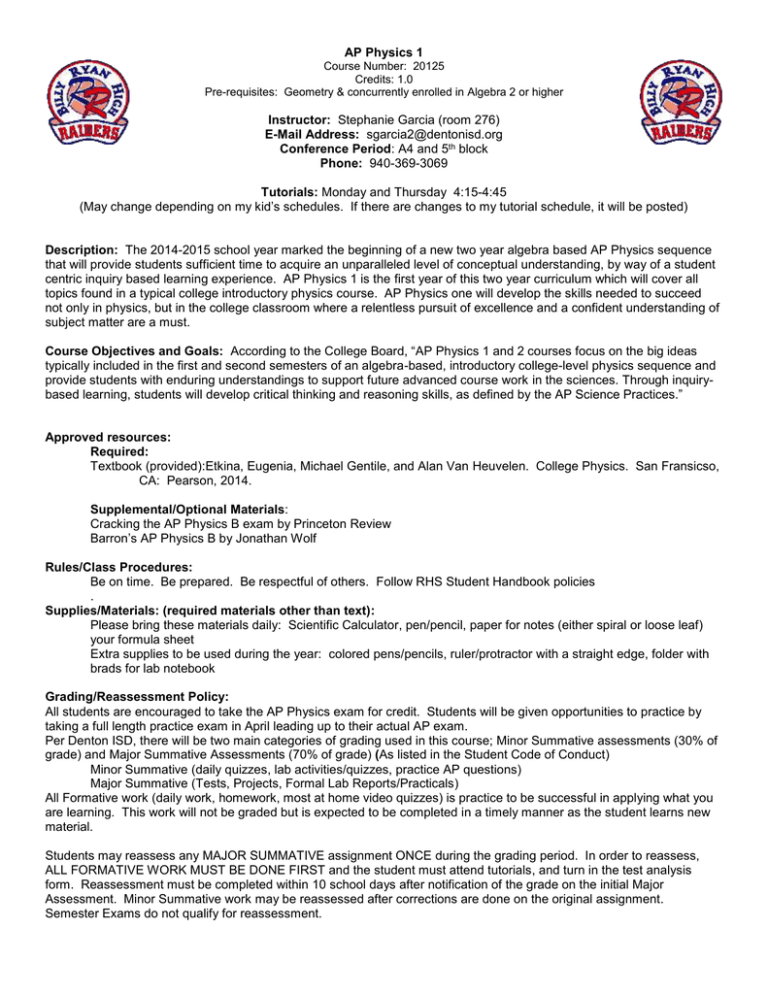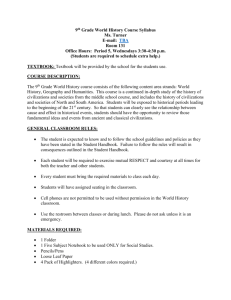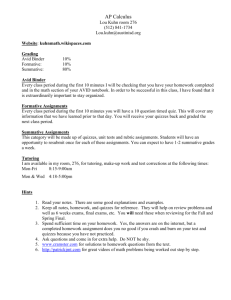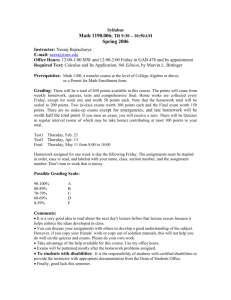AP Physics 1
advertisement

AP Physics 1 Course Number: 20125 Credits: 1.0 Pre-requisites: Geometry & concurrently enrolled in Algebra 2 or higher Instructor: Stephanie Garcia (room 276) E-Mail Address: sgarcia2@dentonisd.org Conference Period: A4 and 5th block Phone: 940-369-3069 Tutorials: Monday and Thursday 4:15-4:45 (May change depending on my kid’s schedules. If there are changes to my tutorial schedule, it will be posted) Description: The 2014-2015 school year marked the beginning of a new two year algebra based AP Physics sequence that will provide students sufficient time to acquire an unparalleled level of conceptual understanding, by way of a student centric inquiry based learning experience. AP Physics 1 is the first year of this two year curriculum which will cover all topics found in a typical college introductory physics course. AP Physics one will develop the skills needed to succeed not only in physics, but in the college classroom where a relentless pursuit of excellence and a confident understanding of subject matter are a must. Course Objectives and Goals: According to the College Board, “AP Physics 1 and 2 courses focus on the big ideas typically included in the first and second semesters of an algebra-based, introductory college-level physics sequence and provide students with enduring understandings to support future advanced course work in the sciences. Through inquirybased learning, students will develop critical thinking and reasoning skills, as defined by the AP Science Practices.” Approved resources: Required: Textbook (provided):Etkina, Eugenia, Michael Gentile, and Alan Van Heuvelen. College Physics. San Fransicso, CA: Pearson, 2014. Supplemental/Optional Materials: Cracking the AP Physics B exam by Princeton Review Barron’s AP Physics B by Jonathan Wolf Rules/Class Procedures: Be on time. Be prepared. Be respectful of others. Follow RHS Student Handbook policies . Supplies/Materials: (required materials other than text): Please bring these materials daily: Scientific Calculator, pen/pencil, paper for notes (either spiral or loose leaf) your formula sheet Extra supplies to be used during the year: colored pens/pencils, ruler/protractor with a straight edge, folder with brads for lab notebook Grading/Reassessment Policy: All students are encouraged to take the AP Physics exam for credit. Students will be given opportunities to practice by taking a full length practice exam in April leading up to their actual AP exam. Per Denton ISD, there will be two main categories of grading used in this course; Minor Summative assessments (30% of grade) and Major Summative Assessments (70% of grade) (As listed in the Student Code of Conduct) Minor Summative (daily quizzes, lab activities/quizzes, practice AP questions) Major Summative (Tests, Projects, Formal Lab Reports/Practicals) All Formative work (daily work, homework, most at home video quizzes) is practice to be successful in applying what you are learning. This work will not be graded but is expected to be completed in a timely manner as the student learns new material. Students may reassess any MAJOR SUMMATIVE assignment ONCE during the grading period. In order to reassess, ALL FORMATIVE WORK MUST BE DONE FIRST and the student must attend tutorials, and turn in the test analysis form. Reassessment must be completed within 10 school days after notification of the grade on the initial Major Assessment. Minor Summative work may be reassessed after corrections are done on the original assignment. Semester Exams do not qualify for reassessment. Absence Work/Makeup Work: It is the student’s responsibility to communicate with the instructor (ahead of time when possible) about any missed work. Email is a great avenue for this. Students are to make arrangements to make up work missed in a timely manner according to RHS school policy. Tutoring is available before or after school according to your instructor’s specific schedule as discussed in class. It is also highly advised that students check the instructor’s Google Classroom daily for schedule, assignments, and helpful information. Homework: The objective of the homework is for you to practice what was learned in class, please use the solutions to the homework to verify your work or to clarify your procedure. Homework will be assigned almost every night with the theory that ‘less is more’. Therefore while only a few problems may be assigned each night, the problems are in depth, cumulative in nature and representative of the kinds of questions you will see on the free-response section of the AP Physics 1 exam. It is ok to work in groups for homework. It is NOT ok to copy homework from a classmate or directly from my website. The homework is your practice for the Minor Summative Quiz. Quizzes: Quizzes may or may not be announced. They may contain questions and/or problems from the homework, the reading assignments, video lectures, and/or based on recently covered or previously learned material. Labs: Labs are performed in groups for data collection purposes only. Your formal lab report should NOT be the result of shared writing, copying, or cooperative effort. There will be Lab Quizzes and Tests. Exams: Exams will consist of both multiple choice and free-response questions. They will be timed in order to prepare you for the AP Physics 1 exam format. All exams have the potential to be cumulative and cover content learned up to that date. Keys to Success: As this course is a College Preparatory course AND a utilizes the FLIPPED CLASSROOM learning method, it is important for the student to prepare ahead of time by watching ALL assigned videos and READING all text material AHEAD of class meeting. Students are encouraged to TAKE NOTES over all new material for your reference and learning. Instructors will expand and practice material in class, but this is not the time for first exposure. Instructors will assume students are prepared for class and encourage class participation daily. Important Dates: AP Study Sessions: last 2 weeks before AP test Practice Exam: Thursday April 14th, 2016 AP Testing dates: Tuesday May 3th, 2016 (afternoon test)






